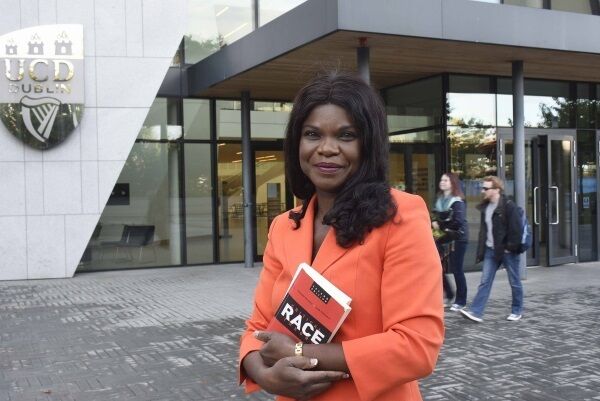For Amandullah de Sondy, a senior lecturer in contemporary Islam in University College Cork (UCC), the very act of going to the office is a painful reminder of the issue of racism in higher education.
“My office is now alarmed”, he tells The University Times. “A couple of years ago I received a death threat to my phone at the university, and a whole number of slurs against me, saying that how dare I come to Ireland and teach people, teach the Irish, I should go back home.” (de Sondy is Scottish).
“It was extremely distressful to me. The individual then also went and called around the university to senior management asking why I had been hired.”
As chair of race equality in UCC, de Sondy paid close attention to a survey by the Higher Education Authority (HEA) which found that university staff from minority ethnic backgrounds are paid less than their white Irish counterparts and are less likely to have permanent employment.
The report published by the HEA noted that “White Irish respondents were in a comparatively more privileged position on the labour market than White Other respondents and respondents from minority ethnic groups”.
De Sondy says that the survey results are “extremely distressing”, but presents “a moment for us all to reflect on how we proceed in terms of race equality at our universities in Ireland”.
Sahar Ahmed, who has recently submitted her PhD thesis in Trinity’s School of Law, has never felt endangered in College, but found the report’s detailing of microaggressions and subtle racism unsurprising. Patronising side glances or offhand, insulting remarks are difficult to formally complain about, she says.
“These kinds of experiences can’t be proved with the evidence that is required for a complaint procedure … you might have an email or two [from which] you can infer a [racist] tone but beyond that, nothing’s written down.”
“You need something to bolster your claim. So who are you going to complain to?”
The survey found that if universities have policies for addressing discrimination, “there is no real implementation of these policies, and no visible outcomes in the staff body. Many respondents referred to the existing policies as a meaningless and ineffective ‘tick box exercise’ or ‘lip service’”. It also argued that unconscious bias training and other initiatives to promote diversity “might not be enough” to further equality in the university workplace.
Ahmed, a native of Pakistan, adds that “none of this is new. Students of colour and staff of colour have been complaining and saying this stuff since as far back as I can think back. So it is sad”.
Another common issue concerns the research of academics of colour. Ahmed explains that white staff can assume that “people of colour lack objectivity with their own subjects – that sort of diminishes our role as researchers, as if we don’t know what we’re doing, [as if] we’re emotional or can’t divorce ourselves and separate ourselves from the research in any way”.
One respondent to the survey said that “students fact-check everything I say in lectures and they don’t behave like that with my colleagues. They also challenge my understanding of ‘how Ireland works’”.
Ahmed says that reporting such microaggressions seems like a futile exercise, and letting these incidents go is less hassle: “They’re small and hard to prove and explain. It’s almost better to sort of let it go, in the end … it’s sort of an everyday occurrence.”
Ebun Joseph, a Nigerian-Irish lecturer and author points out that discrimination can also take the giving lecturers from minority backgrounds peripheral roles in the subjects at which they should be front and centre. Earlier this year, the African Scholars Association of Ireland – of which Joseph is chair – wrote an open letter to the president of University College Dublin criticising its introduction of a “Writing Black” module. Joseph told The University Times: “It’s not just a lecture, it’s an activism.”
Joseph adds that monocultures persist in Irish universities: “If you look at people of colour within the academy, there are people who have conformed, they have assimilated.”
Discrimination and unconscious bias mean that people of colour “don’t even get research funding”, she explains. “We can’t do research … that means that when they start assessment for who should get the job and who should be promoted – when they look through, they will see us, and we have no research done. Because we can’t do research, because we are not being funded to do research.”
Another quote from a respondent in the report said: “I received unfair treatment in career progression. One white male colleague was retained and promoted and I was not – even though I have stronger research output, equal level of teaching and service. I did not report it as I feel no one will hear it or change the decision.”
De Sondy points out that Irish universities have failed thus far to respond publicly to the report. “This is deeply disappointing. We need leadership from the top. We need every Irish university president to make a statement that racism will be countered, that they will aim to make their university anti racist. And we need to take an intersectional approach to making all our universities, anti racist. So I think the survey report is key to identifying some of the horrific experiences that ethnic minorities encounter in our university.”
“We’ve failed”, he adds, “to acknowledge the severity of racism, not just in universities but in wider society. Racism is a word that many of us avoid. I think the time is now for us to accept racism as a fact, as something that is in action and effective within our universities”.
De Sondy and Ahmed believe that the report is a step in the right direction, but Joseph is less convinced. “The system is purely discriminatory … it’s from the core, from the foundation of it all.”







